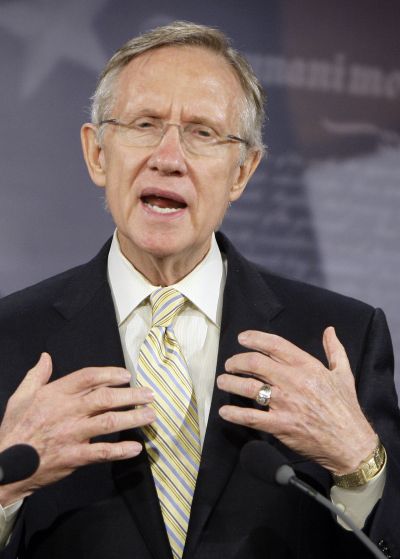Reid says public option included in Senate’s bill
Reform provision would allow states to opt out

WASHINGTON – In a dramatic sign of Democrats’ growing confidence that they have the votes to pass a far-reaching health care overhaul, Majority Leader Harry Reid, D-Nev., said Monday that the bill he sends to the Senate floor next month will include a nationwide “public option” plan.
The provision would allow the federal government to create a medical insurance plan to be offered to Americans who do not get coverage at work as an alternative to private policies – with the proviso that individual states could opt out.
“While the public option is not a silver bullet, I believe it’s an important way to ensure competition and to level the playing field for patients with the insurance industry,” Reid told reporters at the Capitol.
“Under this concept, states will be able to determine whether the public option works well for them and will have the ability to opt out, if they so choose.”
Reid’s announcement reflected what seemed to be a sharp change in the political outlook for one of the most contentious elements in the health care debate.
For months, even many Democrats were convinced the Senate would never approve the public option. Instead, the Senate Finance Committee proposed the creation of state-level co-ops to compete with private insurers. And some senators, most notably Maine Republican Olympia Snowe, favored adding a “trigger” to the public option – letting it be offered several years down the road if private insurers failed to meet cost and coverage targets.
But bolstered by opinion polls showing steady public support for the government option, Senate Democratic head-counters now believe they are within one or two votes of securing the 60-vote majority needed to cut off an expected Republican filibuster.
National surveys have consistently shown that at least 55 percent of Americans favor a new government insurance plan.
Reid’s decision does not settle the debate over an issue that has roiled Democratic lawmakers – as well as the Obama White House – for months. However, since support for the public option has always been stronger in the House, the possibility of its getting through the Senate in a less watered-down form substantially increases the likelihood of final approval by Congress.
The “opt-out” provision falls short of liberals’ hope for unconditional approval of a public plan, but it comes substantially closer than the co-op or “trigger” mechanisms. For one thing, it would be national in scope and could be activated immediately, rather than confined to states or deferred. Also, by requiring states to take legislative action to leave the plan, it increases the burden for opponents.
Monday’s announcement was cheered by both conservative Democrats and liberal grass-roots groups, such as Move-On.org’s political action committee.
“There’s now real momentum towards meaningful health care reform,” MoveOn Executive Director Justin Ruben said.
And Senate Finance Committee Chairman Max Baucus, D-Mont., a centrist whose health care bill did not include a public option, said in a statement that he would support “any provision, including a public option, that will ensure choice and competition and get the 60 votes needed to pass the Senate.”
Reid’s decision also signaled that prospects for any Republican support for a health care overhaul were dimming even further.
Snowe, who has been the only Republican lawmaker to back the Democratic health care campaign, has been sharply critical of creating a new national public option. Snowe said she was “deeply disappointed” by Reid’s choice.
Reid said he was still interested in working with Snowe and other Republicans. “We looked for Republicans on this,” he said. “It’s just a little hard to find them.”
With a 60-40 majority, which includes two independents who caucus with Democrats, Reid has to hold all his members or pick up Republicans to head off a filibuster.
On Monday, several GOP lawmakers quickly assailed Reid’s proposal. “The so-called ‘public option’ is nothing more than a Trojan horse that will ultimately result in government-run health care,” said Sen. John Cornyn, R-Texas.
Republicans were joined by the insurance industry, which has warned for months that a new government competitor that pays providers less could force hospitals and others to charge commercial insurers more.
“A new government-run plan would underpay doctors and hospitals rather than driving real reforms that bring down costs and improve quality,” said Karen Ignagni, president of America’s Health Insurance Plans, the industry’s Washington-based lobbying arm. “The American people want health care reform that will reduce costs, and this plan doesn’t do that.”
Reid said Monday that states would have to choose to opt out of the public plan by 2014, a year after the major Democratic health care bills have envisioned that the new government plan would come into being.
The majority leader did not provide any detail about how states would go about doing that.
Reid did not talk about how his proposal would ultimately be reconciled with even more liberal public option concepts being discussed in the House.